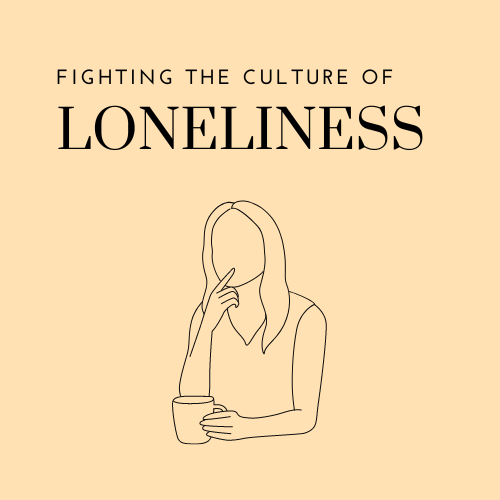Fighting the Culture
The Church has historically stood at odds with the trends of culture.
Sometimes this manifests as an intentional “culture war” posture, in which Christians identify an issue they’re opposed to and then focus their time, attention, and money towards the goal of fighting that one thing – think fighting evolution being taught in schools, the legalization of gay marriage, or the legalization of abortion.
But there are other times in which the Church’s cultural opposition has looked… different. The focus was less on opposition, really, and more on simply doing the good works God prepared for us (Ephesians 2:10). I think about those Christians in the early church who went outside the city gates to gather the children left to die by exposure because they were unwanted (deformed, of the “wrong” sex, etc.). Transformed by Christ, these believers stood against the culture by valuing those who were unvalued.
They stood against the trends of culture not for the sake of being counter-cultural, but as a byproduct of valuing life so much that they would personally sacrifice in order to preserve it. They changed their lives without first demanding that others change theirs.
I think this is when the Church is at its healthiest.
And right now, I’m not sure the Church in America is so healthy.
The Loneliness Epidemic and the Church
It can be hard to determine how many people in the United States are “lonely.” Different surveys use different questions to try and come to an answer, but ultimately this means we’re defining loneliness differently across one survey to the next. It can be confusing.
Still, there is an obvious trend: more Americans are lonely today than ever before, and this is especially true for young adults, older adults, and the poor. And this isn’t really shocking, as it’s a part of many of our lived experiences. A vast majority of us (myself included), have found our lives becoming more distant from the lives of others. A world that used to be truly intimate and social, now sometimes feels more like a virtual maze of self-segregated echo chambers. And the thing about echo chambers is that when your self-affirming voice is echoed back to you from the comments section, you feel lonelier than before.
But what I’m saying isn’t all that new, and it’s hardly shocking. What is shocking (to me at least) is that loneliness persists despite more than half of Americans identifying as Christian. There should be a natural sense, for those of us who actively read the Bible and are trying to have our lives shaped by the person of Jesus, that being relational is a part of living out the Gospel.
I think this is intuitive for many of us. Jesus walked around healing the sick and giving dignity to those without, and we all understand we should do the same. I just don’t think all of us have begun to understand “loneliness” as something like a sickness, and I really don’t think we’ve processed the idea that sitting down with someone at the local coffee shop can be an image of Christ healing the leper.
Being an apprentice of Jesus means sacrificing in order to meet the needs of those around us, and right now those in the Church need to begin sacrificing time the way Christ did. We should be inviting people into our homes, even on nights where it’s incredibly inconvenient for us. We should look for, and welcome, interruptions. How often in the gospels do we see some of the most powerful moments of healing come at moments in which someone was stopping Jesus when he was on the way to some place? Lepers or the blind would call to Jesus from the side of the road, begging for help in scenes that would be reminiscent of the men and women on street corners in my own city today, except instead of yelling my name they hold cardboard signs.
How to Combat Loneliness
The Church should stand in contrast to the culture whenever the culture doesn’t look like the Kingdom of Heaven. This is why the work of early Christians saving vulnerable children is so powerful. There was a cultural norm, an understood reality of life: children who are unwanted should die. But Christians didn’t see it that way. Instead they saw value in each and every human, despite all the modern day logic of the time. These deformed children weren’t just excess mouths to feed, they were images of God to be nourished. And so these believers sacrificed an uncountable amount of time and money to live out a Kingdom ethic that stood in stark contrast to the world.
Right now, society is living under a new set of cultural norms that result in many (if not most) of our neighbors feeling alone. We could talk at length about the factors that are bringing this to fruition (social media, for example) but there really isn’t a point. Don’t get me wrong, understanding the root causes of loneliness can be important, but more often than not the Church’s response should be the same: invite others into a relationship.
That’s it.
In this case, the healing hand of God upon the lives of many of the hurting looks like followers of Jesus inviting people over for dinner, out to coffee, or whatever else. And not just one-time events that allow us to check people off as if they’re a list item, but instead it is the giving of our time as selflessly as the early Church followers gave their money. And why do we do this?
Well, it isn’t to ensure that we ourselves aren’t lonely (though that may be a byproduct). When speaking of hospitality, Jesus actually commanded his followers not to give to those who would repay, but to those who could never repay (Luke 14). Often time we believers can become so focused on fellowship with those we’re comfortable with that we inadvertently create “scratch my back and I’ll scratch yours” dynamics. For sure we are to live in loving community, but there should be an ongoing desire to invite others into that community not based upon whether they “fit” or have something to “add”, but simply because we love them.
This is probably a good time to move from the theory to the practice. Here are some simple things for you and your church community to consider starting now:
- Commit to visiting a nursing home on the same day/time each week, not to have a church service but just to sit and talk with the elderly.
- Invite coworkers over to your home for dinner, and take time to listen to their story. Invite them back the following week. And then again and again…
- Ensure that you and a small group of Christians are meeting regularly, outside of your larger church service. Be a part of a small group, and invite others to it.
- Choose two or three mornings each week to spend time with other people each week. One could be someone you are discipling, another someone who is discipling you.
You’ll notice that every one of these ideas above is a sacrifice, but they’re all very doable. You’re going to have dinner every night, can you make others a part of that? You’re probably going to have coffee (or maybe tea, I don’t judge) in the morning. Couldn’t you wake up earlier and make a second cup for someone else?
Will making changes to your day or week be a sacrifice? Sure, but what we choose to sacrifice demonstrates what we really love. If we are willing to sacrifice time at the gym, at work, at church, or even time with our family, in order to love those we are called to love, then we show that our love is firmly rooted in Christ. But if we hold back, if we reserve certain parts of our life from those who need us, we show ourselves to have idols and strongholds that need to be torn down.
Lay your schedule and your preference on the altar, and watch as the Lord responds by bringing His kingdom to pass through you, who even in your weakness is trying to seek His kingdom first.
For more content like this, check out the Living Room Disciple Podcast here, or check out our website.














